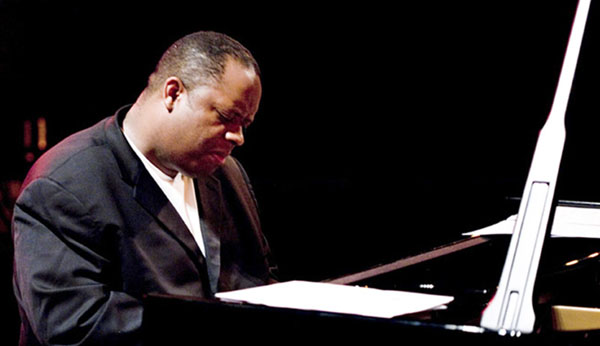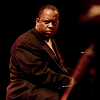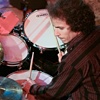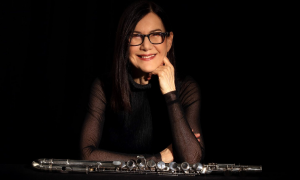Home » Jazz Articles » Interview » Julian Joseph: Joining Jazz and Baseball
Julian Joseph: Joining Jazz and Baseball

Courtesy Andreas Neumann
In 2007, Joseph composed Bridgetower, his first jazz opera. It told the story of George Bridgetower—a virtuoso violinist born in 1779 in Poland to a mother who was an ex-slave—who became the star of the British Prince Regent's Royal Pavilion Orchestra and studied with classical composer Jospeph Haydn, but died in obscurity in 1860. Shadowball focuses on another fascinating but largely unknown story, the tale of baseball's Negro Leagues. Joseph's ambitious plans for the work could lead to a major expansion of baseball and jazz in British schools through an inspired combination of musical and sporting education for young pupils.
In a professional career that started in the mid-'80s Joseph, who is also an accomplished classical pianist, has produced four albums as a leader and has performed with players including

Wynton Marsalis
trumpetb.1961

Billy Cobham
drumsb.1944

Gwilym Simcock
pianob.1981

Joey Calderazzo
pianob.1965
Early in 2010, Joseph was interviewed by Stephen Duffy on BBC Radio Scotland's Jazz House program. Duffy asked Joseph what he thought about the British jazz scene and, in his very positive response, Joseph cited the city of Norwich as an example of the scene's strength.
As Norwich is my home town, I planned to open this interview by asking Joseph to expand on his praise for the city. Then, coincidentally, two days before the interview, the 2010 Mercury Music Prize nominations were announced, with

Kit Downes
keyboardsb.1986
A conversation between the composer and Downes was indirectly responsible for the Joseph's comment about the strength of the Norwich jazz scene: "I was talking to Kit about where he comes from and why he is so good. It's the same thing I asked

Gwilym Simcock
pianob.1981

Courtney Pine
saxophoneb.1964

Branford Marsalis
saxophoneb.1960

Wynton Marsalis
trumpetb.1961

Herbie Hancock
pianob.1940
Joseph also sees other things that make Norwich special: "Whenever I've played in Norwich I've never felt that the audience was just from one age group. There seems to be a real interest in jazz, in improvisation, and in encouraging the young to get into it. There seems to be some kind of enlightenment there, for some reason. I'm sure that it's just some good people who are interested in good music. Norwich Arts Centre also really encourages good young grass roots jazz players to come there. The people who are booking the talent are people you can trust, people who are inspiring."
"So if I have a comment about the British jazz scene, it's that it really warms my heart to know that a scene like Norwich exists. There are pockets throughout the country where there is this great sincerity. In Scotland, for example, there are people like [pianist and educator] Richard Michael and [saxophonist and educator]

Tommy Smith
saxophone, tenorb.1967
Does Joseph worry that the relatively low public profile of jazz in the UK may lead to fewer young people coming to the music? "When I was growing up I was into Herbie Hancock,

Chick Corea
piano1941 - 2021

Weather Report
band / ensemble / orchestraJoseph's thoughts on what inspires young jazz players today raise the obvious question of who inspired the young Julian Joseph? "I come from a musical family: our father used to practice with his band in our cellar. When I was five or six, my mother bought a piano and announced that my brothers and I were all going to learn how to play it. That's how we started to get into music. I was always attracted to the jazz sound: my older brother John and I would search radio stations to find any music that was interesting. We'd put our cassette recorder mike up to the speaker then record it."
Later on, a friend expanded Joseph's musical horizons further: "My friend Errol Shaker, an actor, started to introduce me to players like

Ramsey Lewis
piano1935 - 2022

Jimmy McGriff
organ, Hammond B31936 - 2008

Miles Davis
trumpet1926 - 1991

Charlie Parker
saxophone, alto1920 - 1955
Joseph was lucky enough to get some jazz education at Spencer Park School in Wandsworth, London, during his teenage years: "My drum teacher was

Trevor Tomkins
percussionb.1941
Joseph is now an important figure in British musical education himself. So how did that early exposure to inspirational teachers influence his approach? "Well, I try to stimulate others in the same way" he continues. "My education wasn't regimented; it came out of my own interest. So if I see a good student I try to help them in a way that really suits them. I believe in education, because if it doesn't produce a great player then it can produce a great promoter, or a great audience member, or someone who appreciates music. Not everyone goes way deep into what music means, maybe they just like the sound of it. And I really appreciate people who appreciate jazz."
Joseph's interest in education brings the conversation round to Shadowball. It seems ironic that the first major jazz performance work about baseball comes from a British composer rather than an American one—but does Joseph see it that way? "I don't know really. America is such a vast and fabulous place that I'm sure there have been different ways of touching on these subjects. But one thing missing from the jazz universe is the dramatic side. If you think about the amount of works written for the stage with jazz music and jazz skills—how many can you think of? Name me three pieces."
Put on the spot, I venture Porgy and Bess then flounder and give up. "That's one" agrees Joseph, before kindly agreeing that it's hard to identify more. "There's Treemonisha by

Scott Joplin
piano1868 - 1917
Joseph's enthusiasm came over clearly, even across a rather poor phone line, as he continued to explain Shadowball's genesis. "Shadowball is such a wonderfully rich story, connecting the negro leagues of baseball with jazz music.

Louis Armstrong
trumpet and vocals1901 - 1971

Cab Calloway
composer / conductor1907 - 1994
Bill 'Bojangles' Robinson
various1878 - 1949
Interestingly, Joseph doesn't simply see Shadowball as a way of involving children in music but as offering an attractive and exciting way to bring together some key educational content. "The ideas of history, literacy, numeracy, sport and music all get covered. You need numeracy in terms of scoring the games, literacy is aided by using words and music together. Also, the history of civil rights as well as baseball. They're all in there. And it's not only for the kids—adults can also learn from this."
The Hackney Music Development Trust, based in London, had the original idea for Shadowball, through its Creative Director, Tertia Sefton-Green, and its Director, New York native Adam Eisenberg. Eisenberg mentioned the Negro Leagues to Joseph and gave him some background, before asking him to write an opera. Joseph approached Mike Phillips to write the libretto. "I love the way he writes and he's also a great historian. Also, he writes without a chip on his shoulder, so that this history is for everybody... And I find that Mike really communicates with his narratives."
The team was completed by designer Neil Irish and director Jonathan Moore, both picked by Joseph. Moore had never previously worked with children: "Of course, when he was with the children he was fantastic."
The adult star of the show is vocalist

Cleveland Watkiss
vocalsb.1959
Was Shadowball always intended as a jazz opera, rather than a Broadway-style show? "Well, I think there's a very fine line between the sound of Broadway and jazz. They've influenced each other, so a lot of the songs you hear in Shadowball could be in a West End or Broadway kind of show. But what's really important is the sound of the band and also, when Cleveland feels comfortable with the material he can improvise. There's also some room for improvisation by the band although the piece is really quite set because this helps the children to have some boundaries. But the boundaries can be opened up by those with jazz skills. I'm conceiving it as jazz."
So primarily it's jazz first, then opera? "Yes, absolutely. When you think of any opera, the first thing that comes into your head is the music... For me, jazz opera has the sound of jazz—it has that feeling of jazz, of improvisation, and when something builds in emotional intensity it can be heightened or lowered by the skill of the jazz musician, in the way that a jazz performance can be done."
While Watkiss is central to Shadowball, the musicians are also crucial. However, it's not a large ensemble: "It's just a quintet: piano, bass, drums, a saxophonist who covers alto, flute , clarinet and soprano sax, and a trumpet player with lots of mutes." All of the other performers are school children—over 100 children in each performance. "There are 120 all together. I worked with two primary schools in Hackney (East London)—Kingsmead Primary and Jubilee Primary—and the students came from Years 5 and 6 in each school." This makes them about 10 or 11 years old. "Yes, and we worked for about 18 months with numeracy, literacy, jazz workshops, teaching them about the history of the Negro Leagues and about the history of the great jazz musicians."
Joseph also involved the children in the composition of the opera: "I organized workshops where I took some of the libretto and got the children to write pieces with me, some of which I took away and adapted for use in the opera, some of which I didn't... most of which I didn't" Joseph says, laughing. "Basically, it created a great sense of ownership, and linked all the aspects together. I found our lead characters from the children, coached them in the 6 weeks leading up to the performances. In some cases the kids played multiple roles—players, crowd members, owners."
Shadowball has now been performed three times: "Yes, three times for the public, plus a dress rehearsal. They went really well... the kids were absolutely amazing and Cleveland was just magnificent. It communicated the story and it enabled any audience, adult or children, to know what was going on. Being just over an hour it was short enough and compact enough for children to be able to absorb and learn it."
The plan is now for Shadowball to be performed in schools across Britain, possibly as part of the National Curriculum. Joseph explains the detailed plan: "It should go out to 20 more schools in London. The pupils will also form a London League of baseball. Then it should go to around 200 more schools across England and lead to a national league. That's the big talk about it and I hope it comes off in that way. It's a wonderful way to teach children, bringing several things together in one piece of art."
Any plans for recording, or developing the work for further performance? "Yes, certainly. There is talk about developing it perhaps for the West End, because there is so much more of the story to get deeper into. There's talk of making a film version. And I'll take the material and perform it in a trio, quintet or big band format."
Meanwhile, Joseph is already moving on to his next set of projects, which have more of an emphasiz on performance: "I'm getting ready to write another opera—you've just got to keep doing it" Joseph says, laughing. This time, the opera delves into myth and legend: "It's based on Arthurian legend—my own version of Tristan and Isolde... . Most famously, the story has been told by Wagner: but it's actually from Cornwall, in the south-west of England. So I'm going to bring it home—with some jazz. Mike Phillips and I are just talking about it at the moment but I'll get into it within the next few months. I'm also working with my big band, hoping to get out and do a few more gigs. Also, there's some more stuff with the Trio and I'm half way through a Cuban album. I've recorded five tracks in Cuba, with some of the Buena Vista Social Club guys and I need to finish that off. I'm also working on a project with some great players from Senegal."
Joseph pauses, but not because the list has ended. There's more to tell: "I'm touring with my good friends Viktoria Mullova and Matthew Barley. I have a duo with Matthew, piano and cello. Viktoria has a group including Matthew, myself,

Paul Clarvis
drumsb.1963

Weather Report
band / ensemble / orchestraJoseph is clearly a man who is happy in his work, and such is his talent and adaptability there is every indication that his opportunities will continue for many years yet. Who knows, in years to come Joseph may be remembered as The Man Who Brought Baseball To Britain: for now, jazz should be happy to have Joseph in its midst as a talented and tireless promoter of the music.
Tags
Comments
PREVIOUS / NEXT
Julian Joseph Concerts
Julian Joseph | Atmospheres In Audio Theatre
Turner SimsSouthampton, UK
Support All About Jazz
 All About Jazz has been a pillar of jazz since 1995, championing it as an art form and, more importantly, supporting the musicians who make it. Our enduring commitment has made "AAJ" one of the most culturally important websites of its kind, read by hundreds of thousands of fans, musicians and industry figures every month.
All About Jazz has been a pillar of jazz since 1995, championing it as an art form and, more importantly, supporting the musicians who make it. Our enduring commitment has made "AAJ" one of the most culturally important websites of its kind, read by hundreds of thousands of fans, musicians and industry figures every month.






 Buy Now
Buy Now























